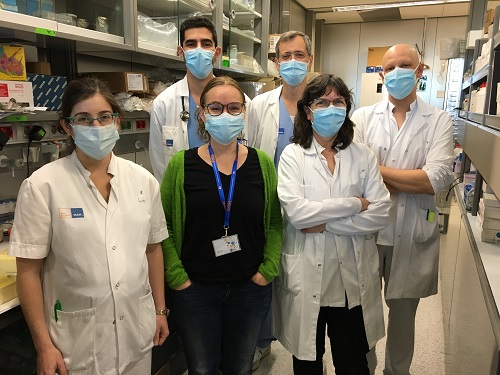
30/03/2022 - General information
A study by the Neuroimmunology Research Group at the Hospital del Mar Medical Research Institute indicates that patients with more NK cells (Natural Killer cells) expressing a specific marker have a superior treatment response and can wait longer before receiving a new dose. This would allow treatment personalisation and improve the efficiency and safety of the drugs.
A study by the Neuroimmunology Research Group at the Hospital del Mar Medical Research Institute (IMIM) has validated a possible marker that could improve the efficiency of one of the main multiple sclerosis treatments. The marker is a specific type of immune system cell, known as NK (Natural Killer) cells, which express a specific receptor on their surface, NKG2C.

From left to right, Antia Moreira, Adrián Macias, Andrea Vera, José Enrique Martínez, Elvira Munteis y Miguel Ángel Rubio.
Currently, patients with multiple sclerosis are treated with anti-CD20 monoclonal antibodies, which are designed to eliminate the B-lymphocyte population in peripheral blood and thus control disease activity. These drugs are scheduled to be administered once every six months, although it is unclear whether this time period is appropriate for all patients. Several studies indicate that, depending on the drug given, it takes between six months and a year and a half for the levels of the B-lymphocyte population to recover. For this reason, finding a marker that allows the administration schedule to be personalised would optimise its use and avoid side effects, although these are usually minor. As Dr. José Enrique Martínez, head of the study, points out, at the moment the administration guidelines "are as if we were bombarding the immune system every six months." He adds that "If we had a marker to measure which patients could delay the kinetics of B-cell repopulation the most, it would be hypothetically very useful to see how to administer treatments in a personalised way."
The work, which analyses data from 38 patients with multiple sclerosis, takes into account the role that NK cells play in killing B cells in conjunction with monoclonal antibodies. When they express higher levels of a certain marker on their surface, the activator NKG2C, their function is more intense. Consequently, "If there are NK cell that express more of this marker, they will kill more B cells and the repopulation of these in these patients will be slower. It may therefore be interesting to determine whether patients who have more NK cells with this marker actually benefit from a delay in the antibody dose", explains Dr Martínez.
Nevertheless, the researchers acknowledge that it is still too early to change the treatment guidelines, even though the results of the study "open the door to work on more personalised medicine in multiple sclerosis." And they point out that the analysis to determine which patients could benefit from delayed treatment, flow cytometry of blood samples, is a technique available at most healthcare centres.
Reference article:
Moreira A, Munteis E, Vera A, Macías Gómez A, Bertrán Recasens B, Rubio Pérez MÁ, Llop M, Martínez-Rodríguez JE. Delayed B cell repopulation after rituximab treatment in multiple sclerosis patients with expanded adaptive NK cells. Eur J Neurol. 2022 Mar 5. doi: 10.1111/ene.15312. Epub ahead of print. PMID: 35247022.
© Institut Hospital del Mar
d'Investigacions MèdiquesLegal Notice and Privacy Policy | Cookie Policy | Site Index | Accessibility | Find Us | Contact